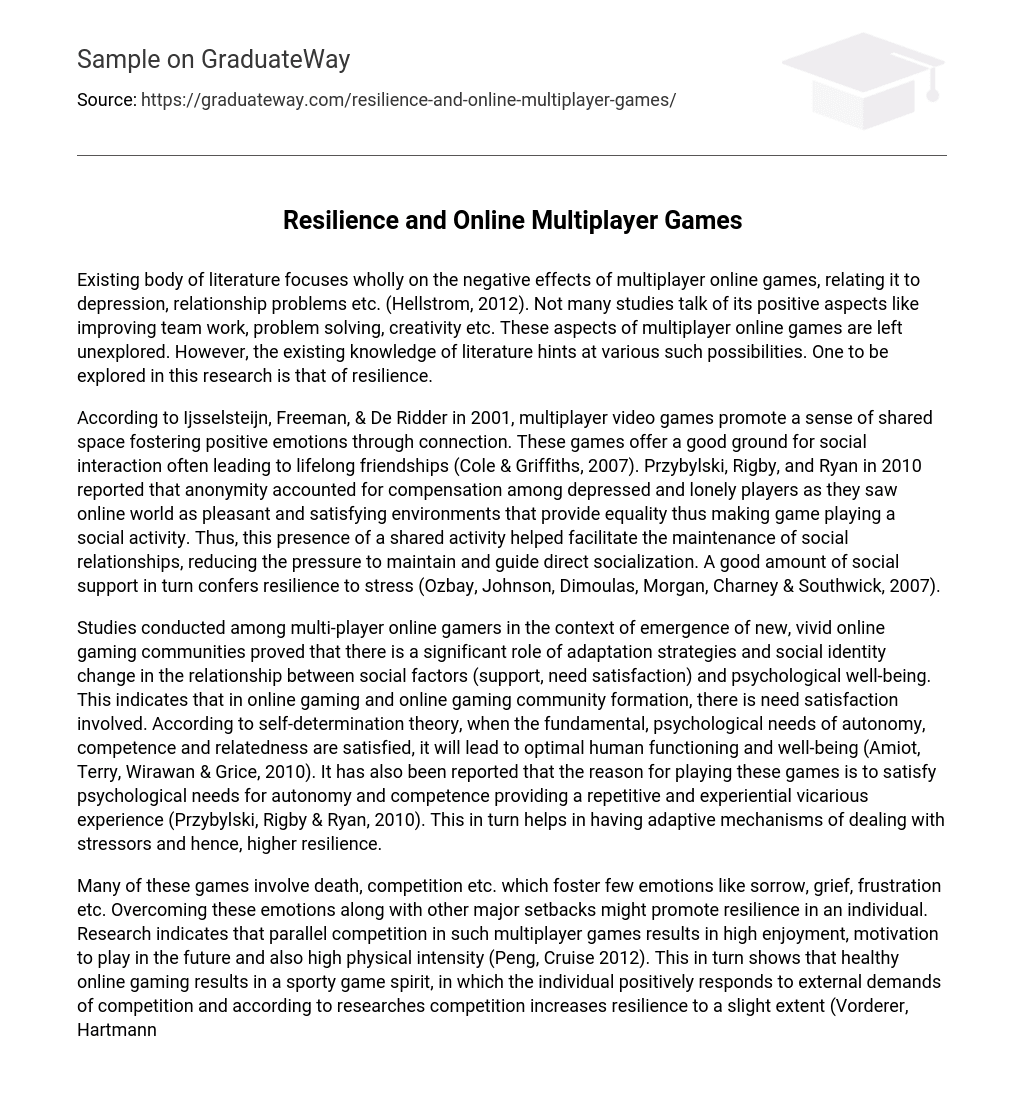Existing body of literature focuses wholly on the negative effects of multiplayer online games, relating it to depression, relationship problems etc. (Hellstrom, 2012). Not many studies talk of its positive aspects like improving team work, problem solving, creativity etc. These aspects of multiplayer online games are left unexplored. However, the existing knowledge of literature hints at various such possibilities. One to be explored in this research is that of resilience.
According to Ijsselsteijn, Freeman, & De Ridder in 2001, multiplayer video games promote a sense of shared space fostering positive emotions through connection. These games offer a good ground for social interaction often leading to lifelong friendships (Cole & Griffiths, 2007). Przybylski, Rigby, and Ryan in 2010 reported that anonymity accounted for compensation among depressed and lonely players as they saw online world as pleasant and satisfying environments that provide equality thus making game playing a social activity. Thus, this presence of a shared activity helped facilitate the maintenance of social relationships, reducing the pressure to maintain and guide direct socialization. A good amount of social support in turn confers resilience to stress (Ozbay, Johnson, Dimoulas, Morgan, Charney & Southwick, 2007).
Studies conducted among multi-player online gamers in the context of emergence of new, vivid online gaming communities proved that there is a significant role of adaptation strategies and social identity change in the relationship between social factors (support, need satisfaction) and psychological well-being. This indicates that in online gaming and online gaming community formation, there is need satisfaction involved. According to self-determination theory, when the fundamental, psychological needs of autonomy, competence and relatedness are satisfied, it will lead to optimal human functioning and well-being (Amiot, Terry, Wirawan & Grice, 2010). It has also been reported that the reason for playing these games is to satisfy psychological needs for autonomy and competence providing a repetitive and experiential vicarious experience (Przybylski, Rigby & Ryan, 2010). This in turn helps in having adaptive mechanisms of dealing with stressors and hence, higher resilience.
Many of these games involve death, competition etc. which foster few emotions like sorrow, grief, frustration etc. Overcoming these emotions along with other major setbacks might promote resilience in an individual. Research indicates that parallel competition in such multiplayer games results in high enjoyment, motivation to play in the future and also high physical intensity (Peng, Cruise 2012). This in turn shows that healthy online gaming results in a sporty game spirit, in which the individual positively responds to external demands of competition and according to researches competition increases resilience to a slight extent (Vorderer, Hartmann & Klimmt, 2003). Thus we can say that along with social support, confidence and control, that these games promote, are also indicative of high resilience and achievement of flow state (Yurtoğlu, 2018). This increases motivation and optimism in the players, which might further contribute to higher resilience, than single game players.
In addition to this it was proved that multi-player game player’s performance is positively associated with the experience of self-efficacy where they learn to compensate their unfulfilled self-efficacy through their success in gaming. Good amount of self-efficacy has been linked to resilience (Skoch, 2003). Through this, they might try to change their ability to cope effectively in various circumstances. Further it has been reported that social and life self-efficacy are negatively associated with loneliness and depression (Hye Rim Lee & Eui Jun Jeong, 2015).
The identification of several different social identities among the participants reveals the potential importance of social identities in governing how MMOG (massively multiplayer online games) based social relationships operate. As demonstrated by Obst et al. (2002a), the extent to which a person identifies themselves as a member of a community influences the degree to which they feel a part of that community. We can see that there is a possibility of forming a collectivistic community in the gaming community. There is a boost in self efficacy as they feel part of a community and they feel a sense of belongingness. This might also foster collective efficacy, which in turn could increase resilience (Kadetz, 2018).
There is another study which focuses on how games are primarily motivating to the extent that players experience self-sufficiency, proficiency and empathy while playing. Need satisfactions should thus predict subsequent motivation to play, whereas need frustration should predict a lack of persistence. People who possess high motivation related to the psychological needs tend to show an increased and intense involvement in the game (Ryan, Rigby, &Przybylski, 2006). Involvement is further more in multi-player online games as given mention in the same research. This makes it clear that the multi-player game play itself satisfies the psychological needs. Satisfaction of these needs can further aid in improving resilience.
There is another model called dualistic model of passion which was proposed to explain player’s inclination towards investing their time and energy in online games. Harmonious passion is related to achieve common goals in game missions and social interactions and unrelated to escaping from life situations and it is mainly related to exploration and socialization. On the other hand, obsessive passion predicts the negative aspects associated with online gaming, such as urge to play, large amount of time spent in playing, low levels of enjoyment and states of post game tension. This is mainly associated with dissociation and achievement. Thus, Griffiths and Wan and Chiou in 2002, stated that this online gaming can be used as a way of counteracting deficiencies in player’s lives and thus the need to avoid reality may be a need to avoid problems that the player is unable or unwilling to face.
In addition to this, results of an experiment on Massively Multiplayer Online games show that, gamers who had higher levels of Actual-Ideal Self Discrepancy (AISD) and higher levels of depression tended to have higher escapism (Li, M.A., Liau & Khoo, 2011). Here gaming is seen as a coping strategy to avoid negative affect caused by AISD.





